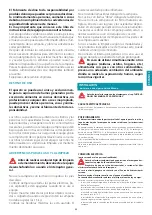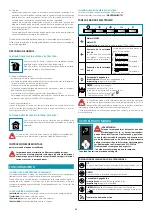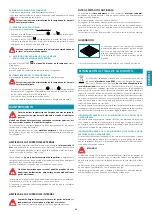
30
If the equipment is sold or transferred to another per-
son, make sure that the booklet is also supplied so
that the new user can be made aware of the hood's
operation and relative warnings.
After the stainless steel hood has been installed, it
will need to be cleaned to remove any residues re-
maining from the protection adhesive as well as any
grease and oil stains which, if not removed, can cause
irreversible damage to the hood surface. To properly
clean the unit, the manufacturer recommends using
the supplied moist wipes, which are also available
sold separately.
Insist on original spare parts.
INTENDED USE
The equipment is solely intended to be used to
extract fumes generated from cooking food in
non-professional domestic kitchens: any other
use is improper. Improper use can cause damage
to persons, things, pets and exempts the Manu-
facturer from any liability.
The equipment can be used by children over the age
of 8 and by persons with reduced physical, sensory
and mental abilities, or with no experience or knowl-
edge, as long as they do so under supervision or after
having received relative instructions regarding safe
use of the equipment and understanding of the dan-
gers connected to it.
Children are not to play with the equipment. Clean-
ing and maintenance by the user must not be carried
out by children without supervision.
USE AND CLEANING WARNINGS
Before cleaning or carrying out mainte-
nance operations, disconnect the equip-
ment by removing the plug or switching off the
main switch.
Do not use the hood with wet hands or bare feet.
Always check that all electrical parts (lights, extractor
fan) are off when the equipment is not being used.
The maximum overall weight of any objects placed
or hung (if applicable) on the hood must not exceed
1.5 Kg.
Always supervise the cooking process during the use
of deep-fryers: Overheated oil can catch fire.
Do not leave open, unattended flames under the
hood.
Do not prepare food over an open flame under the
hood.
Never use the hood without the metal anti-grease
filters: in this case, grease and dirt will deposit in the
equipment and compromise its operation.
Accessible parts of the hood can be hot when used at
the same time as the cooking appliances.
Do not carry out any cleaning operations when parts
of the hood are still hot.
There can be a risk of fire if cleaning is not carried out
according to the instructions and products indicated
in this booklet.
Disconnect the main switch when the equipment is
not used for long periods of time.
If other appliances that use gas or other fu-
els are being used at the same time (boiler,
stove, fireplaces, etc.), make sure the room
where the fumes are discharged is well-ventilat-
ed, in compliance with the local regulations.
INSTALLATION
only intended for qualified personnel
Before installing the hood, carefully read the chapter 'SAFETY
INSTRUCTIONS AND WARNINGS'.
TECHNICAL FEATURES
The technical specifications are exhibited on the labels located inside the hood.
POSITIONING
The minimum distance between the highest part of the cooking equip-
ment and the lowest part of the hood is indicated in the installation in-
structions.
Generally, when the hood is placed over gas cookers, the distance must be at
least 65 cm (25.6''). However, according to standard EN60335-2-31, the minimum
distance between the cooker and lower part of the hood can be reduced to the
quota reported in the installation instructions.
Should the instructions for the gas cooker specify a greater distance, this must
be taken into consideration.
Do not install the hood outdoors and do not expose it to outdoor environment
(rain, wind, etc.).
ELECTRICAL CONNECTION
(only intended for qualified personnel)
Disconnect the equipment from electrical mains power supply be-
fore carrying out any operations on the hood.
Ensure that the wires inside the hood are not disconnected or cut:
in the event of damage, contact your nearest Servicing Department.
Refer to qualified personnel for electrical connections.
Connection must be carried out in compliance with the provisions of law
in force.
Before connecting the hood to the electrical mains power supply, check that:
• voltage supply corresponds with what is reported on the data plate located
inside the hood;
• the electrical system is compliant and can withstand the load (see the techni-
cal specifications located inside the hood);
• the power supply plug and cable do not come into contact with tempera-
tures exceeding 70 °C;
• the power supply system is effectively and properly connected to earth in
compliance with regulations in force;
• the socket used to connect the hood is within reach.
In case of:
• devices fitted with cables without a plug: the type of plug to use is a ''stand-
ardised'' one. The wires must be connected as follows: yellow-green for earth-
ing, blue for neutral and brown for the phase. The plug must be connected to
an adequate safety socket.
• fixed equipment not provided with a power supply cable and plug, or any
other device that ensures disconnection from the electrical mains, with an
opening gap of the contacts that enables total disconnection in overvoltage
category III conditions.
Said disconnection devices must be provided in the mains power supply in
compliance with installation regulations.
The yellow/green earth cable must not be cut off by the switch.
The Manufacturer declines all responsibility for failure to comply with the safety
regulations.
















































